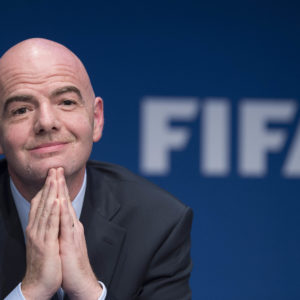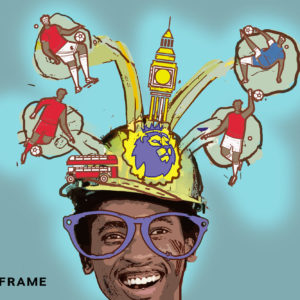Royal AM saga is a right royal mess
Critics of the Premier Soccer League say it is allowing money to break all the rules, playing favourites and silencing those who dare to question it.
Author:
13 September 2021

It should surprise no one that upstart football club Royal AM turned their legal battle to be reinstated as the GladAfrica Championship winners and their purchase of Bloemfontein Celtic into what looked like a reality show.
The club, originally called Royal Eagles, was founded in Pietermaritzburg in 2014 by construction magnate Shauwn Mkhize and her then-husband Sbu Mpisane, the former Durban metro police constable who was once described as the “richest cop in Durban”. Their 2018 divorce gave rise to Royal AM after an ownership battle over the club.
Mkhize then gained fame in the family’s reality television show Kwa Mam’Mkhize, which was launched in January 2020 and invited viewers to “join her on her journey as she reclaims her life as a single woman who happens to be a mother, a sister and a business mogul”.
Related article:
Last year, their son Andile Mpisane became club chairperson at age 19. He drew hilarity on social media in February this year for being fielded in a GladAfrica Championship game, displaying questionable diski skills and clad in long white leggings.
Given the soap opera narrative, some say the unashamedly bling Royal AM can attract a much needed base of younger as well as female fans to the DStv Premiership. But the manner in which they eventually got to the premier division, and the role of the Premier Soccer League (PSL) in it, raised eyebrows. The PSL’s handling of the saga has shone a light on the decision-making and potential conflicts of interest of its senior management and executive committee.
Comedy of errors
In January, Polokwane City failed to name the five Under-23 players in their squad – as required by National First Division (NFD) rules – in a 1-0 win against Sekhukhune United, who protested on the day. A PSL disciplinary committee hearing deducted three points from Polokwane, but did not award these points to Sekhukhune. It became yet another problematic PSL disciplinary matter in that a crucial decision came late in a season.
Advocate Hilton Epstein’s subsequent arbitration award of three points to Sekhukhune was pronounced two days after Royal AM beat Pretoria University and celebrated like they were promoted, despite needing a point in their last game against Cape Town All Stars. The points awarded to Sekhukhune meant the Limpopo club were the champions and ensured their promotion to the top division – and toppled Royal were forced into the play-offs.
A court saga followed in which Royal, complete with flashy advocate Dali Mpofu, lost numerous efforts to have the arbitration award overturned. Simultaneously, they refused to honour their four promotion-relegation play-off matches. Bizarrely, Royal even lodged an application asking for PSL acting chief executive Mato Madlala and the league to be held in contempt of court, but it was dismissed by the high court in Johannesburg.
Related article:
Much was unusual about the PSL’s reaction to the Epstein arbitration, the court saga and the sale of Celtic to Royal, including that an executive committee meeting was held the day after the arbitration award. The following day, the PSL put out a statement that it was the “view of the league that it is not correct, as the arbitration ruling holds, that the PSL disciplinary code is silent and that the [disciplinary committee] had to impose a mandatory sanction under the [world football governing body] Fifa disciplinary code”.
The league took this stance in court papers. The PSL did not apply the arbitration award and update its NFD log until, a month later, Deputy Judge President Roland Sutherland, having dismissed the high court review application, also dismissed the application for leave to appeal. On the NFD final day, the fact that Royal were still incorrectly at the top of the log fuelled their argument they had been “robbed” of the title. That Sekhukhune had to go to the high court in a separate application to ask that the arbitration ruling be applied was notably unusual.
Buying status
Meanwhile, in the sale of Bloem Celtic, the documentation named Mkhize’s sister Nozipho Ngubo as “the acquirer”. This would be to circumvent the National Soccer League (NSL) Handbook ruling that a buyer may not have been involved in owning a club within a year. Article 14.4 clearly states that such a person may not acquire a club “directly or indirectly” if they have “directly or indirectly” held an interest in another. Yet everyone knows Royal AM, owned by Mkhize, have bought Celtic.
PSL chairperson Irvin Khoza stressed that it took the executive committee three days to interrogate the merits of the sale. But Royal had been found guilty on all charges and had a disciplinary committee outcome pending over the matches they boycotted.
Related article:
There were also issues involving Tshakhuma Tsha Madzivhandila FC (TTM) buying Royal’s NFD status. TTM owner Lawrence Mulaudzi allegedly still owed players money from his purchase of Bidvest Wits’ status in 2020, which he resold within eight months after running into financial problems. Mulaudzi reportedly had problems paying players when TTM competed in the NFD.
Despite these issues, the PSL seemed hell-bent on getting Royal into the DStv Premiership. Allegations have been made of inappropriate bias on the part of Madlala, who is allegedly a close friend of Mkhize. Perhaps for the PSL the notion of cash-flush Royal being part of the top league was too inviting to ignore. But a dangerous precedent affecting promotion and relegation can be set, namely that “the one with the deepest pockets can just string everything out in court”, said one of Sekhukhune’s legal representatives, who did not want to be named.
“If it hadn’t been for the PSL intervention, we would not have been through all of this [the court saga],” the person said. “Even in their open papers they at first argued in support of Royal AM and Polokwane, and that came back to bite them because Dali Mpofu then threw it back at them and said ‘but this is what you argued initially’.
“They became involved in an almost disguised way, by bringing their own application to ask the court to declare that article 22 of the Fifa code [of ethics] is not binding on the PSL [disciplinary committee’s] rulings.”
Conflict of interest
The legal representative said the apparent bias raises questions about conflicts of interest arising from the PSL’s senior leadership being club owners too. “That goes fundamentally to the governance structure of the league. No one is prepared to tackle it. Why doesn’t the Minister [of Sport Nathi Mthethwa], who tackled cricket so bravely, take this on? In fact, he’s on record as saying that all sporting federations … must be run by majority independent boards.
“These conflicts are why South African sport is in such a crisis. In football, the most glaringly obvious thing is that the league is run by Irvin, who owns [Orlando] Pirates. The chairman of finance is [Kaizer Chiefs owner] Kaizer Motaung. And the acting CEO, going on six years, owns [Lamontville Golden] Arrows.
“And the woman [Mkhize] buying Celtic has done everything to take the league to court and owes the league millions of rands in legal costs. In her affidavit, she says the conduct of the league CEO is ‘unlawful and unconstitutional and warrants him to be jailed’.”
Related article:
Former general manager of AmaZulu Lunga Sokhela, whose family sold the club to Sandile Zungu last year, has been vocally critical of the NSL board of governors – the 32 member clubs of the PSL – having become a “rubber-stamping” body, where he says contentious issues are seldom questioned.
“Look, I think it was clumsy,” Sokhela says of the PSL’s handling of the Royal AM saga. “Some of these things can be dealt with at the beginning to avoid a disaster at the end. And where my fight started with the PSL was in the clumsiness and absolute bias in the way people are dealt with. There’s a rule book for Lunga and the likes of [Black Leopards owner David] Thidiela and people who are not suck-ups, and a rule book for those who are always so far up people’s backsides.
“Once a ruling is made, whether at the disciplinary committee, arbitration or court, the league needs to implement that immediately, whether they like it or not. Because they didn’t implement it, they made another blunder on top of the many blunders. Now MaMkhize goes to court because her argument was ‘the league was not changed – at the final match I was No 1’.
“And it goes back to the obvious conflict of interest of having Madlala as acting CEO. And that’s an issue people all want to dance around because they are scared of being victimised. That is the culture of the PSL – you’ve got to shut your mouth and look at the wrong things being done.”
Cowed and silenced
Sokhela says when club owners see an apparent bending of rules in favour of a club, it stops them being vocal in the board of governors as they know they can end up at the wrong end of such favouritism. He also says the public nature of such controversies can scare off potential billionaire club owners as well as sponsors for clubs.
The high turnover in terms of sales of teams could be limited through stricter regulation of the percentage of a club’s budget spent on their squad, similar to financial fair-play rules in Europe, he says. “The problem is if you’ve got club owners running the league and they’re thinking, ‘My competitive advantage is that I can pay these exorbitant salaries, so I can’t put this policy that’s going to hurt me.’”
There have been criticisms of Sokhela’s outspokenness, including a suggestion that he is bitter over the handling of a matter where Fifa deducted six points from AmaZulu in 2018 for unlawfully terminating Namibian Phineas Nambandi’s contract. Others have questioned why he has aired such views after leaving football.
Related article:
The situation he describes, though, would surely discourage others from being vocal from inside the tent. And at least one current DStv Premiership club owner, who did not want to be named, confirmed Sokhela’s views.
“Money is breaking all the rules at the moment,” the owner said. “What Lunga said about the [board of governors] is 100% correct. The reality is that’s why many club owners don’t attend [meetings]. I send delegates because you’re made to go there and discussion is not encouraged. Whatever the motions are, the moment the PSL chairman drives a point there are very few challenges to it.”
The owner said with many teams on the edge owing to the financial pressures of the South African economy in the midst of Covid-19, the perception that the PSL top leadership is damaging the product in its decision-making “could encourage more sales of teams”.
Denying culpability
Khoza and PSL legal head Michael Murphy addressed a recent press conference aimed at clearing the air on issues surrounding the Royal AM legal matters and Celtic’s sale.
“This was not a matter instigated by the league,” Khoza said. “It was a matter raised by Polokwane City. We got involved only as respondents. Once we were respondents the matter went further to litigation, where Royal AM intervened to be co-applicants.
“But being a respondent there was a second part – we got involved because of the ruling of the arbitration that the NSL Handbook is silent in the sanction that was discharged by the arbitrator. We said the handbook is not silent. That’s the only involvement we had.”
Related article:
Murphy, on the issue of Royal’s conduct of not attending matches and having a disciplinary committee hearing outcome pending, TTM’s debts, how such factors were weighed in approving them to purchase clubs and whether that was damaging the league’s product, said the PSL was satisfied by the assurances it received.
“Sometimes we all know what we would like to see, and we might think that this looks bad or that looks bad,” Murphy said. “The reality is there was a particular context in which this decision was taken.”
Despite the league’s assurances, there is a point at which too many alarm bells ring and perceptions of impropriety become pervasive and damaging. The Royal AM saga seems sure to go down as such an instance.






